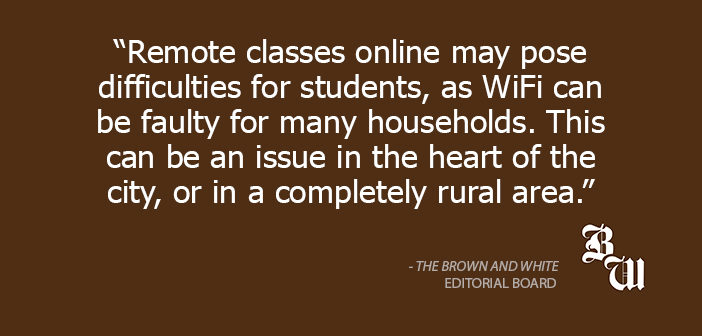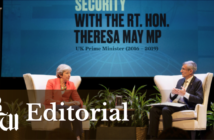COVID-19 has had a profound impact on billions of people now, whether they have contracted the virus or are simply taking precautionary measures to avoid it.
Congress assembled a COVID-19 stimulus package that is bringing relief to families who qualify under certain criteria. However, a demographic that has recently expressed concern about not qualifying for stimulus checks are college students, despite tremendously feeling the impact of the virus.
Key stipulations that forbid college students from receiving a check include being labeled as “dependent” and being over the age of 18. If college students live under their parents’ roof and support, then they are most likely not filing their own tax returns, and are therefore considered dependent.
However, each college student’s circumstance may vary, and the government has overlooked the demographic.
For instance, if a student is enrolled under a work study program, then under the university’s newly instituted COVID-19 policies, the student is most likely continuing to get paid by the institution.
On the other hand, for students who also have part-time jobs at locations unaffiliated with the school, and who got laid off due to COVID-19, the government should feel obligated to include them in the stimulus package.
These may be students who are reimbursing their parents for, for example, their phone bill, car bill and off-campus rent, yet because they are classified as “dependent,” they do not qualify for a stimulus check. That is not right.
Groups of college students are feeling particularly impacted by the virus in a variety of other ways, as well. Students’ study abroad experiences came to an abrupt end due to the pandemic, and the opportunity to finish their journey of a lifetime was taken away from them.
Remote classes online may pose difficulties for students, as WiFi can be faulty for many households. This can be an issue in the heart of the city, or in a completely rural area.
Seniors will not get their “last dance” at school and, with graduations being suspended, they are feeling a lack of emotional closure. They have worked extremely hard for almost four years, and now they can’t celebrate their accomplishment with their friends, whom they built long lasting relationships with, by their side.
Underclassmen who have developed strong bonds with the upperclassmen now don’t have the opportunity to spend more time and give proper farewells to the people they have looked up to.
First-years can’t finish off their first year at Lehigh, arguably the most memorable year and a time when friendships are solidified for their entire college career. This comes after a first semester of uncertainty, coming from high school, not knowing the direction their lives may be headed.
These are all prime examples of how the virus has negatively affected our lives as college students. However, we must remember the importance of keeping this all in perspective and understand that things are a lot worse for other demographics.
The elderly population and people with serious health conditions are at significantly higher risk of fatality from COVID-19. We need to remind ourselves that while our college experience has been hurt by this pandemic, there are students who may have family members who are being directly affected by this virus, and our utmost priority should be comforting them.
We are in a time of uncertainty, where everyone is being affected in their own way. Now, more than ever, we should be understanding of our peers. You never know what people are dealing with in their own household. Reaching out to your peers, or simply just picking up the phone to check in, can go a long way for someone.
Just because the student body is not physically together on campus anymore, does not mean we have lost the ability to communicate. This virus may have taken away our hopes of finishing off the semester in a particular way, but it has not taken away our chance to continue our special relationships that were solidified at Lehigh.






Comment policy
Comments posted to The Brown and White website are reviewed by a moderator before being approved. Incendiary speech or harassing language, including comments targeted at individuals, may be deemed unacceptable and not published. Spam and other soliciting will also be declined.
The Brown and White also reserves the right to not publish entirely anonymous comments.
1 Comment
This is absolutely true, and my students and I are living it. My teaching and their educations are suffering because of it. If they were paying Lehigh-scale tuitions, I would absolutely advocate for their getting their money back.
I would like here to call out a specific member of Congress who, despite having rural broadband as part of his portfolio, has done nothing — has in fact hidden — from this issue rather than stepping up to work with ISPs to ensure that people across America have the access they need to keep going to school and work via a medium that makes the work harder than usual even when it’s working, impossible when it’s not, but is the only one we have.
His name is Rep. David Wayne Loebsack, D-IA2. He’s made rural broadband a major cause of his; it’s hard to see what else he’s managed to do in his 14 years in Congress. He’s normally quiet, too quiet, and people here politely say he “likes to keep a low profile” rather than “he doesn’t seem to do much of anything and is basically invisible, no idea what we’re paying him for except to show up with the mob and vote on the big bills,” but I’m not from here and I’m not that polite.
His staff are the least knowledgeable, and, weirdly, least curious Dem staffers I’ve ever met, and when I caught one of them at 10 pm the other night by calling the number on Dave’s facebook page, he was really pretty put out, told me he was spending time with his son. While I do understand the need for work-life balance, this is what we call a national emergency, and when you work for one of 435 Members of Congress, maybe your bedtime stories don’t happen for a little while. This guy’s name is Rob Sueppel. He has not responded since to any questions or phone calls.
Dave Loebsack and his staff are also notably quiet about the fact that Iowa is one of five states left without a shelter-in-place order; our governor has stopped officials from ordering them locally. I live across the street from an assisted-living facility, and I see there is another ambulance out there now. We are 39th in the nation for getting people tested.
Rep. David Wayne Loebsack, AWOL in a national emergency.